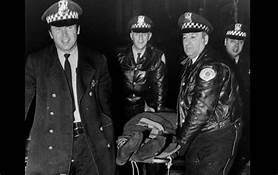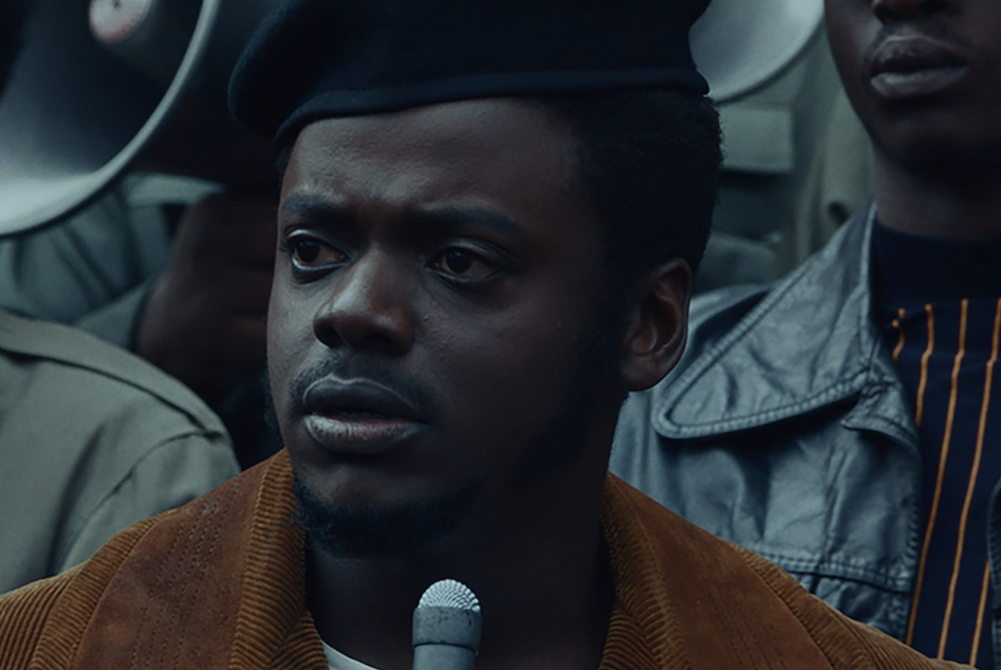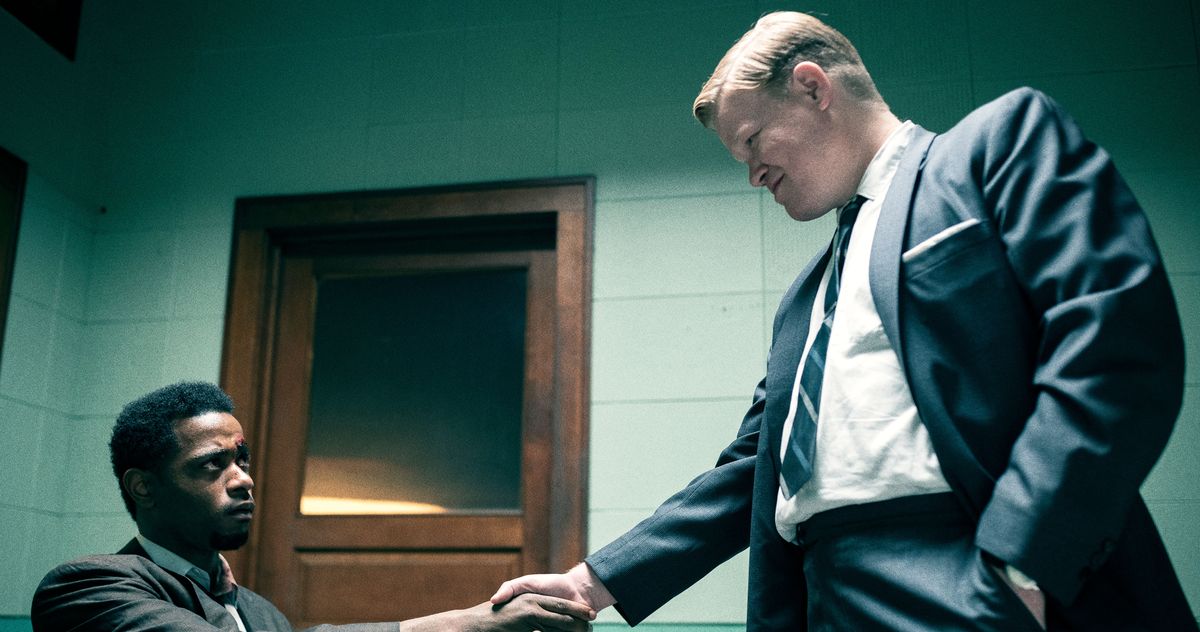The secret FBI informant who betrayed Black Panther leader Fred Hampton
The new movie ‘Judas and the Black Messiah’ explores the role William O’Neal played in Hampton’s death

William O'Neal, the FBI informant who infiltrated the
Black Panthers in Illinois, circa February 1973. (Don Casper/Chicago Tribune)
By Robert Mitchell
Feb. 20, 2021 at 6:00 a.m. CST
William O’Neal’s secret life came to an end three years after the Chicago police raid that killed charismatic Black Panther leader Fred Hampton.
In a front-page story on Feb. 3, 1973, the Chicago Tribune identified O’Neal, the onetime Black Panther security chief, as an informant who aided the FBI in an investigation of a murder ring operated by current and former members of the Chicago Police Department.
“In addition to being the key government tipster in the case," the Tribune reported, O’Neal “may have witnessed one of the slayings last May of two men who allegedly were killed by policemen and former policemen.”
Attorney Jeffrey Haas reacted with amazement that morning as he read the story and studied an accompanying photo of O’Neal. The details of the piece were disturbing enough, but Haas had another reason for astonishment.
Haas represented the Black Panthers in court after confrontations with local law enforcement in the 1960s. He was one of the attorneys leading a $47 million civil suit against the city of Chicago, Cook County and the U.S. government on behalf of family members and survivors of the Dec. 4, 1969 raid in which Hampton, 21, and Mark Clark, 22, died.
Haas had known O’Neal for years — or thought he did.
“Could the guy I knew with the disarming smile and casual attitude be involved in murder for hire?” Haas recalled wondering in his book on the Black Panther raid and its aftermath. “More important, did he drop the dime on Fred?”
The answer, recounted in the film “Judas and the Black Messiah”, was yes. The film captures Hampton’s dedication, eloquence, occasionally violent rhetoric and commitment to Black empowerment. O’Neal struggles with his dual role as a party member and FBI informant as he becomes increasingly sympathetic to the Panthers and their leader.
The film reaches a grim climax with its depiction of the predawn raid in which Chicago police assigned to the office of Cook County State’s Attorney Edward V. Hanrahan burst into a first-floor apartment on West Monroe Street.
Inside, they unleash the withering gunfire that claimed the lives of Hampton and Clark and injured six others, including two officers. A grand jury report after the raid concluded that virtually all of the gunfire during the raid came from police.
Hanrahan claimed hours after the raid that officers fired in response to “the immediate, violent, criminal reaction of the occupants in shooting at" the police. Bobby L. Rush, then the minister of defense for the Panthers and today a Democratic congressman from Chicago, declared “We’ll prove it to the world that Fred Hampton was murdered.”
Rush’s assertion resonated with many in the Black community who believed Hampton died because of a government plot against the Panthers.
“If the United States is successful in its drive to crush the Black Panther Party, it won’t be long before it seeks to crush your party,” the Rev. Ralph David Abernathy of the Southern Christian Leadership Conference warned at Hampton’s funeral.

Black Panthers leader Fred Hampton
No one at the time suspected O’Neal of betrayal, but in the days leading up to the raid he supplied the FBI with a diagram of the apartment used in the raid by police. Even so, O’Neal seemed shocked by the death of Hampton and the scene in the apartment, O’Neal’s uncle Ben Heard told the Chicago Reader in 1990.
“There was papers strewn all over the floor, blood all over," Heard said. "There was a trail of blood from where they had dragged Fred’s body. Bill just stood there in shock. He never thought it would come to all this.”
The tangled story of O’Neal and the Panthers began in the summer of 1967, according to court documents, when O’Neal was 17 and the FBI launched its COINTELPRO program aimed at undermining Black militants. Files discovered by antiwar protesters who broke into an FBI office in Pennsylvania included a memo from FBI Director J. Edgar Hoover ordering agents to “disrupt, misdirect, discredit, or otherwise neutralize” militant groups, Haas wrote.
When the Black Panthers opened a branch in Chicago in November 1968, the “Chicago FBI was quick to implement the tactics mandated by Washington,” according to the lawsuit filed by Haas and his colleagues. FBI Agent Roy M. Mitchell instructed O’Neal — whom he had initially contacted while O’Neal was in the Cook County jail — to infiltrate the fledgling militant group, according to the lawsuit.
At first, O’Neal ran errands and handled odd jobs. “He was basically a flunky, gofer and handyman,” Rush told the Tribune.
O’Neal eventually assumed security responsibilities for the Panthers while keeping the FBI apprised of Panther activities. After he learned that the Panthers contemplated a merger with the Blackstone Rangers gang, the FBI concocted an anonymous letter sent to Rangers leader Jeff Fort warning “that the Panthers had a ‘hit’ out on him,” the lawsuit said.

Chicago police remove the body of Fred Hampton, leader of the
Illinois Black Panther Party, who was slain in a gun battle with police on Dec. 4, 1969.
While O’Neal said he respected Mitchell, he insisted to the Tribune that he grew to admire Hampton and the Panthers. “These guys started impressing me a little more than Mitchell did,” O’Neal said of the Panthers. “They started talking about Black struggle and Black rights, and their whole program seemed to make sense.”
O’Neal said he argued with Mitchell about the Panthers and their goals but still fed the FBI information.
“I felt proud being on the law enforcement side,” O’Neal told the Tribune. “But I really was just a pawn in a very big game.”
The game ended for O’Neal after the 1973 Tribune exposé. He moved to California after entering the federal witness protection program but struggled with his new life and split up with his wife, according to the Tribune. “If you ask me if I’m a happy man — no, I’m not happy. I’m not even content,” he told the newspaper.
O’Neal remarried and returned to Chicago in the 1980s — published reports differ on when — with his new wife and became a father, the Tribune reported. Interviewed for the 1990 documentary series “Eyes on the Prize II,” O’Neal declined to describe himself as a hero, then added, "at the same time I don’t feel ashamed.” But he never came to terms with the implications of his double life, Heard said.
O’Neal died early in the morning on Jan. 15, 1990, after bolting out of Heard’s apartment and into traffic on the Eisenhower Expressway. The Cook County Medical Examiner ruled his death a suicide.
“I think he was sorry he did what he did," Heard told the Reader. "He thought the FBI was only going to raid the house. But the FBI gave it over to the state’s attorney and that was all Hanrahan wanted. They shot Fred Hampton and made sure he was dead.”
The new movie ‘Judas and the Black Messiah’ explores the role William O’Neal played in Hampton’s death
William O'Neal, the FBI informant who infiltrated the
Black Panthers in Illinois, circa February 1973. (Don Casper/Chicago Tribune)
By Robert Mitchell
Feb. 20, 2021 at 6:00 a.m. CST
William O’Neal’s secret life came to an end three years after the Chicago police raid that killed charismatic Black Panther leader Fred Hampton.
In a front-page story on Feb. 3, 1973, the Chicago Tribune identified O’Neal, the onetime Black Panther security chief, as an informant who aided the FBI in an investigation of a murder ring operated by current and former members of the Chicago Police Department.
“In addition to being the key government tipster in the case," the Tribune reported, O’Neal “may have witnessed one of the slayings last May of two men who allegedly were killed by policemen and former policemen.”
Attorney Jeffrey Haas reacted with amazement that morning as he read the story and studied an accompanying photo of O’Neal. The details of the piece were disturbing enough, but Haas had another reason for astonishment.
Haas represented the Black Panthers in court after confrontations with local law enforcement in the 1960s. He was one of the attorneys leading a $47 million civil suit against the city of Chicago, Cook County and the U.S. government on behalf of family members and survivors of the Dec. 4, 1969 raid in which Hampton, 21, and Mark Clark, 22, died.
Haas had known O’Neal for years — or thought he did.
“Could the guy I knew with the disarming smile and casual attitude be involved in murder for hire?” Haas recalled wondering in his book on the Black Panther raid and its aftermath. “More important, did he drop the dime on Fred?”
The answer, recounted in the film “Judas and the Black Messiah”, was yes. The film captures Hampton’s dedication, eloquence, occasionally violent rhetoric and commitment to Black empowerment. O’Neal struggles with his dual role as a party member and FBI informant as he becomes increasingly sympathetic to the Panthers and their leader.
The film reaches a grim climax with its depiction of the predawn raid in which Chicago police assigned to the office of Cook County State’s Attorney Edward V. Hanrahan burst into a first-floor apartment on West Monroe Street.
Inside, they unleash the withering gunfire that claimed the lives of Hampton and Clark and injured six others, including two officers. A grand jury report after the raid concluded that virtually all of the gunfire during the raid came from police.
Hanrahan claimed hours after the raid that officers fired in response to “the immediate, violent, criminal reaction of the occupants in shooting at" the police. Bobby L. Rush, then the minister of defense for the Panthers and today a Democratic congressman from Chicago, declared “We’ll prove it to the world that Fred Hampton was murdered.”
Rush’s assertion resonated with many in the Black community who believed Hampton died because of a government plot against the Panthers.
“If the United States is successful in its drive to crush the Black Panther Party, it won’t be long before it seeks to crush your party,” the Rev. Ralph David Abernathy of the Southern Christian Leadership Conference warned at Hampton’s funeral.
Black Panthers leader Fred Hampton
No one at the time suspected O’Neal of betrayal, but in the days leading up to the raid he supplied the FBI with a diagram of the apartment used in the raid by police. Even so, O’Neal seemed shocked by the death of Hampton and the scene in the apartment, O’Neal’s uncle Ben Heard told the Chicago Reader in 1990.
“There was papers strewn all over the floor, blood all over," Heard said. "There was a trail of blood from where they had dragged Fred’s body. Bill just stood there in shock. He never thought it would come to all this.”
The tangled story of O’Neal and the Panthers began in the summer of 1967, according to court documents, when O’Neal was 17 and the FBI launched its COINTELPRO program aimed at undermining Black militants. Files discovered by antiwar protesters who broke into an FBI office in Pennsylvania included a memo from FBI Director J. Edgar Hoover ordering agents to “disrupt, misdirect, discredit, or otherwise neutralize” militant groups, Haas wrote.
When the Black Panthers opened a branch in Chicago in November 1968, the “Chicago FBI was quick to implement the tactics mandated by Washington,” according to the lawsuit filed by Haas and his colleagues. FBI Agent Roy M. Mitchell instructed O’Neal — whom he had initially contacted while O’Neal was in the Cook County jail — to infiltrate the fledgling militant group, according to the lawsuit.
At first, O’Neal ran errands and handled odd jobs. “He was basically a flunky, gofer and handyman,” Rush told the Tribune.
O’Neal eventually assumed security responsibilities for the Panthers while keeping the FBI apprised of Panther activities. After he learned that the Panthers contemplated a merger with the Blackstone Rangers gang, the FBI concocted an anonymous letter sent to Rangers leader Jeff Fort warning “that the Panthers had a ‘hit’ out on him,” the lawsuit said.
Chicago police remove the body of Fred Hampton, leader of the
Illinois Black Panther Party, who was slain in a gun battle with police on Dec. 4, 1969.
While O’Neal said he respected Mitchell, he insisted to the Tribune that he grew to admire Hampton and the Panthers. “These guys started impressing me a little more than Mitchell did,” O’Neal said of the Panthers. “They started talking about Black struggle and Black rights, and their whole program seemed to make sense.”
O’Neal said he argued with Mitchell about the Panthers and their goals but still fed the FBI information.
“I felt proud being on the law enforcement side,” O’Neal told the Tribune. “But I really was just a pawn in a very big game.”
The game ended for O’Neal after the 1973 Tribune exposé. He moved to California after entering the federal witness protection program but struggled with his new life and split up with his wife, according to the Tribune. “If you ask me if I’m a happy man — no, I’m not happy. I’m not even content,” he told the newspaper.
O’Neal remarried and returned to Chicago in the 1980s — published reports differ on when — with his new wife and became a father, the Tribune reported. Interviewed for the 1990 documentary series “Eyes on the Prize II,” O’Neal declined to describe himself as a hero, then added, "at the same time I don’t feel ashamed.” But he never came to terms with the implications of his double life, Heard said.
O’Neal died early in the morning on Jan. 15, 1990, after bolting out of Heard’s apartment and into traffic on the Eisenhower Expressway. The Cook County Medical Examiner ruled his death a suicide.
“I think he was sorry he did what he did," Heard told the Reader. "He thought the FBI was only going to raid the house. But the FBI gave it over to the state’s attorney and that was all Hanrahan wanted. They shot Fred Hampton and made sure he was dead.”








